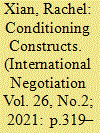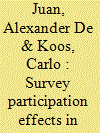|
|
|
Sort Order |
|
|
|
Items / Page
|
|
|
|
|
|
|
| Srl | Item |
| 1 |
ID:
178457


|
|
|
|
|
| Summary/Abstract |
Political psychology and social constructivism exist in an “ideational alliance” against realism; however, both have overlooked behavioral conditioning, the basis of animal learning. Through six stages situated in international negotiation behaviors, the theory of Conditioning Constructs shows how behavioral conditioning can take parties from specific to diffuse reciprocity, rationalist to constructivist cooperation, and crisis to durable peace. In stages 1, 2 and 3, parties use negotiated agreements to exit prisoner’s dilemmas, continuously reinforce cooperation during agreement implementation, and satiate to rewards as initial implementation finalizes. In stages 4, 5 and 6, parties receive fresh rewards with new negotiations, undergo intermittent reinforcement with periodic agreements thereafter, and finally attribute cooperative behavior to actor constructs. Conditioning Constructs demonstrates that agency is possible in socially constructed structures through willful participation in conditioning through negotiation; and that, while Anatol Rapoport’s tit-for-tat strategy is suited to initial cooperation, intermittent reinforcement better preserves late-stage cooperation.
|
|
|
|
|
|
|
|
|
|
|
|
|
|
|
|
| 2 |
ID:
180189


|
|
|
|
|
| Summary/Abstract |
Do survey participants in conflict zones respond differently if they have been interviewed before? Academic and policy interest in postwar political opinion has increased tremendously. One unexpected consequence of this surge of survey research is a growing probability that individuals will be interviewed multiple times. However, if participating in one survey causes respondents to change their attitudes or behavior, their subsequent survey responses may be biased in comparison to the rest of the sample population. Our article aims to investigate such ‘survey participation effects’ in conflict contexts. We draw on original survey data collected in the eastern Democratic Republic of Congo (DRC). In our representative sample, 18% of respondents report that they have been interviewed before. Multivariate analyses demonstrate that their stated attitudes on social relations, political institutions, gender norms, and wartime victimization differ substantively from the responses of first-time interviewees. Moreover, our analyses indicate that experienced respondents have specific response styles – in particular, a tendency to support extreme response options. While substantive bias in multivariate analyses seems to be rather rare, our findings indicate that researchers should be aware of the footprints of data collection efforts in areas frequently targeted by household and opinion surveys.
|
|
|
|
|
|
|
|
|
|
|
|
|
|
|
|
|
|
|
|
|